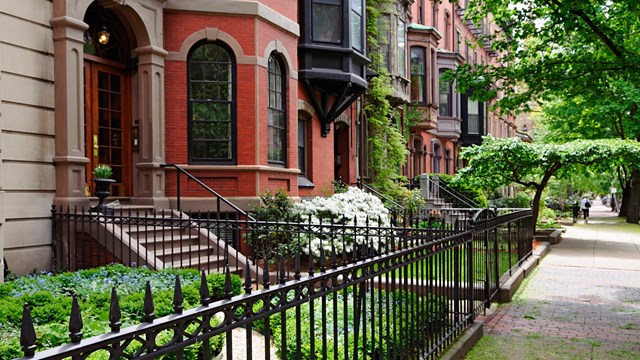Concern over health and an evolving legal landscape has prompted a number of condo and co-op boards in Suffolk County, Massachusetts, as well as communities across New England to ban cigarette smoking in individual smoking units. This restriction has ignited a debate over health/nuisance versus individual rights, and both sides can be vehement in advocating for their position.
Harbor Towers on East India Row in Boston, the city’s largest condominium complex, is the latest condo community to amend its bylaws and go smoke-free. The twin, waterfront 40-story luxury high rise buildings’ residents voted to ban smoking in all common areas, outside areas and within each unit. The new amendment went into effect in March. The new clause contains a provision that will allow current residents, both owners and renters, to continue smoking in their units. When a unit is sold or rented to a new tenant, the smoking ban will kick in for that space. The condo’s trustees and unit owners voted 80 percent in favor of the new rules. Penalties for violators are being worked out.
“When you think about it, it’s pretty amazing to get 80 percent of people to agree on anything,” says Richard M. Atwater Jr., general manager of Harbor Towers Condominiums. “A very small percentage of people voted against it. If people voted against it, my sense is that either they were current smokers and they felt strongly about their right to smoke or if they were a non-smoker, they may have felt that this was too over-reaching to go into people’s residences. That’s my guess; I can’t go inside of people’s heads.”
Last year, the Residences at the Ritz-Carlton Towers, Boston Common, went completely smoke-free with no grandfather clause for any of its 132 units of the north high-rise tower. Rule-breakers will get a written warning following the first infraction, a $500 fine for the second and the Ritz-Carlton condo association will pursue court action after that.
The debate over public health and property value versus individual rights is ongoing with no immediate end in sight over this pervasive, volatile issue.
“Market research keeps showing that people prefer to live in a building that has a building-wide no-smoking ban. So if there is a higher demand for it and a preference for it, then why not meet that demand?” says Chris Banthin, a lawyer with Northeastern University’s School of Law’s Public Health Advocacy Institute in Boston. “There are also a growing number of complaints from condominium unit owners about smoke seeping into their apartments from the neighboring units. That happens in a lot of properties and it’s a difficult issue. We’ve also seen a lot of lawsuits. One’s right to privacy ends at the neighbor’s nose.”
Harbor Towers is the twenty-third condo association in Suffolk County in the past two years to pass an anti-smoking amendment to its rules, says Banthin.
“I look at the registry of deeds and they are all divided by county, so when a condo changes its master deed it has to be recorded,” says Banthin. “Have some condos tried to ban smoking in another way that’s not proper protocol? Sure, it wouldn’t surprise me.”
While many understand smoking bans in common areas, others think it is setting a dangerous precedent to enact a smoking bans in individual condominium units.
“I think there are a lot of Americans—I wouldn’t say they are the majority—recognize the anti-smoking movement for what it is: It’s a movement that uses very, very exaggerated scientific evidence to expand their power and control over the lives of other people,” says Stephen Helfer, a smokers’ rights advocate and Cambridge resident. “It’s controlling the behavior of people in their own homes. What’s next? Banning wood-burning fireplaces, wood-burning stoves and fragrances in public? If I go to a public beach and someone is cooking hot dogs, and I don’t like the smell of hot dogs but I can smell it, does that mean your right to cook hot dogs at a public beach ends? This is opening the door to controlling many, many aspects of the individual citizen’s life. A lot of people are opposed to this, even if they are non-smokers. Suppose I say ‘your free speech rights should end when it hits my eardrums, if I don’t like what you are saying?’”
A Healthy Perspective
For many concerned residents, the call for a smoking ban is directly related to health concerns. According to the CDC (Centers for Disease Control and Prevention) nearly 1 in 5 Americans smoke cigarettes. The University of Minnesota estimated that just 15 percent of cigarette smoke is inhaled by the smoker, leaving the balance to linger. Secondhand smoke contains over 4,000 chemicals, including more than 40 cancer-causing agents and 200 known poisons. The Environmental Protection Agency classifies it as a Class A carcinogen.
The health perspective of secondhand smoke, especially its effect on children, motivated housing officials to ban smoking in Boston’s public housing beginning September 2012.
Around 25,000 of those residents will receive letters stating that their buildings will be smoke free. Residents must agree to the new policy when they sign their annual leases or face eviction.
With that move, Boston is set to become the largest city in the nation to ban smoking in public housing.
“We feel this [smoking ban] is in the best interests of our residents,” says Boston Housing Authority spokeswoman Lydia Agro. “When you have buildings with multiple apartments next to each other, there is no way to contain smoke.”
“If you are going to ban smoking in public housing, it’s controlling the behavior of people in their own homes,” says Helfer. “If you’re going to ban that, what’s next?”
For smokers, it becomes a “rights” issue as many believe they should be free to smoke in the privacy and confines of their apartment or unit. There has been push-back by pro-smoking organizations such as Citizens Lobbying Against Smoker Harassment (CLASH). A recent press release from founder Audrey Silk underscored CLASH’s general stance on banning. “It’s time to take this country back from the cultists mistakenly referred to as ‘Public Health’ and let the deprogramming begin. Smoking is okay... as an informed adult’s choice. Once chosen there’s nothing to be ashamed of, nothing to apologize for, and we certainly don’t need anyone’s approval or permission nor to be banished like criminals from view.”
While health is a leading concern, certain board members will bring up other negative aspects of permissive smoking such as a possible decline in property values.
“A smoke ban is going to increase the economic value of the property,” says Banthin. “Condo owners are worried about the value of their units, and they should be. It’s green and healthy housing, and who doesn’t want that? People will pay for that. There’s also safety reasons, too, because cigarettes cause fires. It’s the leading cause of fire-related mortality in Massachusetts and probably every other state.”
Co-op and Condo Procedures
As more boards field complaints from disgruntled unit owners, the question on how best to proceed becomes a necessary starting point.
“If condo owners are interested in going smoke-free they should call their attorneys and say ‘we want to pass a bylaw amendment’; they know how to do that,” says Banthin. “Condominiums do that all the time. They know how to hold a mini-political campaign in their condominium and then they’ll hold a vote. They will decide yes or no. It’s up to the owners to decide. There is model bylaw language out there. This is not heavy lifting. Lots of condominiums have tried to go smoke free and failed.”
In order to amend existing bylaws, a unit-owner vote of approximately two-thirds or 75 percent is required.
“No smoking in a condominium doesn’t mean no smokers are allowed to live there,” says Banthin. “It’s like bars and restaurants, smokers are welcome to eat and drink there but not to smoke there. It’s the same thing.”
For most irritated neighbors claiming that secondhand smoke is interfering with their health or the health of their children, they look to a “nuisance” clause which is noted in all bylaws and proprietary leases.
In 2010, a 32-year old Boston condo unit owner with a history of asthma sued her real estate agent, downstairs neighbor and her condo board because secondhand smoke was adversely impacting her quality of life.
After two years and a $45,000 renovation, the buyer of the $405,000 condo fled the smoke-filled unit. The buyer alleged that she was told by the broker that the source of the secondhand smoke was the outgoing seller and once the seller moved out, the fumes would evaporate. They didn’t. It turned out the smoke was emanating from her downstairs neighbor’s unit.
“It was a closely watched case,” says Banthin. “The unit owner sued the broker under the theory that the broker misrepresented that there would be no smoke in the unit. And then her neighbors and the association were sued under different theories.”
She eventually settled with her downstairs neighbor and condo board for an undisclosed sum, but her case against the real estate broker went to trial. In Burrage v. DeAngelo, et al., the unit owner sought $70,000 to cover renovation cost, personal injuries and emotional distress. The Massachusetts jury rejected her claim.
A Smoke-Free Future?
With more buildings going smoke-free, including new rental buildings with non-smoking lease stipulations, it seems logical that in ten years’ time, a non-smoking building will be as common as a non-smoking bar. “It’s my opinion that this trend of non-smoking buildings will continue,” says Atwater. “The dangers of second-hand smoke have become well-documented and because of that, you will see more of this in the future.”
As is the case with all building-wide initiatives, Atwater says passing a smoking ban comes down to informing the residents and letting them decide what’s in their best interest. “It comes down to getting important, accurate information to the unit owners so they can make an informed decision,” says Atwater.
“Right now we are in a period of time where smoking restrictions are getting tighter and tighter,” says Helfer. “The public is hyper-sensitized to tobacco smoke. It’s because of the last twenty to thirty years of anti-smoking propaganda to which they have been subjected. Will this trend continue? I hope not, but right now we are in the throes of it.”
W.B. King is a freelance writer and a frequent contributor to New England Condominium.







Comments
Leave a Comment